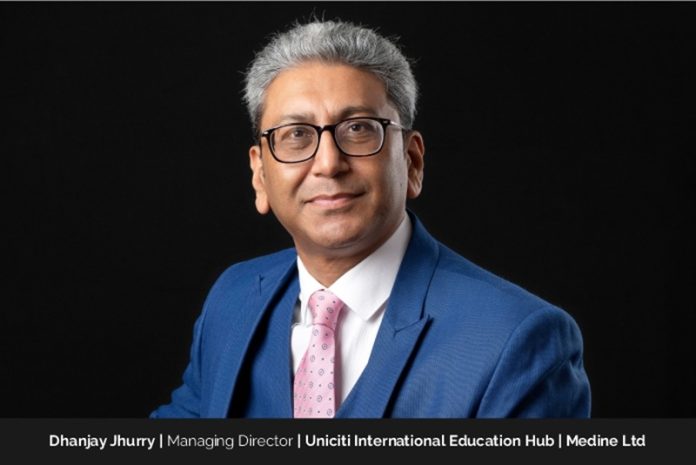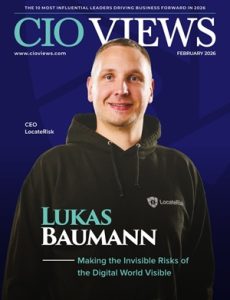Prof. Dhanjay Jhurry is the Managing Director of Education at Mauritius-based Medine Ltd., overseeing its education arm, the Uniciti International Education Hub (UIEH). He is responsible for strategic direction, international partnerships, and the development of tertiary education and innovation. Previously, he served as the Vice-Chancellor of the University of Mauritius. Dhanjay’s ability to infuse new ideas into academia, his impeccable strategic vision, his success in manoeuvring through challenging times, and his commitment to shaping students’ futures have made him a transformative leader not only in Mauritius but also in Africa’s education space.
What inspires Dhanjay daily is the opportunity to share knowledge generously, empower others to believe in their potential, and inspire through consistent, values-based leadership. “I strive to act with probity and purpose, remaining focused on long-term goals that create meaningful transformation — whether in individuals, institutions, or society,” he says.
Journey: From a PhD in Polymer Chemistry to Managing Director Position
Dhanjay holds a PhD in Polymer Chemistry. During his doctoral research at Bordeaux University, France, he developed novel polymeric materials from sucrose in collaboration with a major French sugar company, Beghin-Say. “This early exposure to industry-academia synergy shaped my understanding of applied research,” Dhanjay says. It also started his journey into research and innovation.
In 1992, after completing his PhD, Dhanjay began working as a Research Chemist at Flamel Technologies. He got the opportunity to work on biomedical innovations like biodegradable implants and advanced wound dressings. “It deepened my appreciation of research as a tool for societal impact,” he says. Three years later, in 1995, Dhanjay returned to his home country, Mauritius, and joined the University of Mauritius as lecturer in the Department of Chemistry. Polymer chemistry was not part of the university’s curriculum at the time. Dhanjay introduced it as well as developed undergraduate and postgraduate courses. By 1997, he began supervising MPhil/PhD students — two of whom completed in 2001.
“These formative years shaped my academic leadership style, focused on building capacity, nurturing talent, and driving innovation through research grounded in relevance and purpose,” Dhanjay says.
For fifteen years, he dedicated himself to developing fundamental polymer research at the University of Mauritius. Then, he felt it was time to pursue impact through application. In 2011, he founded the Centre for Biomedical and Biomaterials Research, the University’s first dedicated research centre. That same year, Dhanjay was appointed National Research Chair in Biomaterials and Drug Delivery. It was the first such chair instituted by the Ministry of Tertiary Education, Science and Research in Mauritius.
“Leading the centre required far more than bench work,” Dhanjay recalls. In addition to overseeing day-to-day operations, he had to secure state-of-the-art equipment and put together a sustainable budget. He had to deal with plenty of logistical and financial challenges as well. And, then, in 2017, the Vice-Chancellor position at the University of Mauritius became available. Encouraged by his colleagues, who were confident that his leadership would help steer the institution into its next phase of growth, Dhanjay applied for the position. In March 2017, he took over as the university’s Vice-Chancellor.
“In that leadership role,” Dhanjay says, “I have worked to elevate the University’s research profile, expand partnerships, and strengthen governance structures — building on my scientific foundation to drive broader institutional development.”
In August 2022, Dhanjay moved to Medine Group as Managing Director of Education.
Encountering Multiple Challenges
Most leaders’ paths are strewn with challenges. Dhanjay’s has been no exception. He specifically recalls the challenges he encountered while serving as Vice-Chancellor of the University of Mauritius. Financial deficits and structural inefficiencies were major ones. The lack of operational flexibility also posed a problem. And he experienced resistance to change in some quarters.
Several significant issues arose because of the university’s financial deficit situation. Dhanjay had to implement difficult but necessary measures to address this financial crisis. These included reducing overtime, controlling excessive teaching loads, and enforcing operational discipline. “Though unpopular, these steps were essential for stability,” he says. Simultaneously, he remained focused on academic progress. He introduced internal research funding and created multidisciplinary research poles to foster innovation.
Reforms were very much needed at the university, but it proved to be a challenge to convince the University Council to support them, according to Dhanjay. He had to be persistent, rely on data-driven advocacy, and maintain a clear sense of purpose to make the council agree. “It was often tiring and isolating, but the vision of a resilient, research-driven institution kept me going,” Dhanjay recalls.
“These efforts ultimately set the University on a more sustainable path and laid the foundation for its transformation into a forward-looking, globally engaged institution,” he adds.
A Career Dotted with Milestones
The milestones achieved by Dhanjay outweigh the challenges he has faced. His professional journey is dotted with many achievements and accolades. For him, one of his most fulfilling milestones has been supervising PhD students and watching them grow into confident researchers taking on roles worldwide.
Another milestone he talks about is the Centre for Biomedical and Biomaterials Research, which he founded in 2011. Despite experiencing challenges, he shifted the centre’s focus to building institutional capacity for high-impact science. “Seeing it become a national leader in biomaterials and nanotechnology has been rewarding,” Dhanjay says.
He achieved several milestones during his tenure as the Vice-Chancellor of the University of Mauritius. He led major reforms, launched new programs, and promoted internationalisation. His efforts eventually elevated the university’s regional and global profile. Dhanjay recalls that he could succeed because of his vision, courage, and resilience.
“Now, at Uniciti International Education Hub, I continue this leadership journey,” he says, “building a world-class academic ecosystem connecting Africa and Asia through innovation, inclusion, and educational excellence.”
Success Is Impacting People and Community
Dhanjay does not view success from a prism of personal accolades. For him, it means the legacy one leaves for others to grow. It also means enabling the next generation through education, mentoring, and transforming institutions. “True success empowers people long after you’ve moved on,” Dhanjay says.
He feels he is successful when his efforts impact the community. For example, at the University of Mauritius, when he launched a Newsletter promoting their contributions to the Sustainable Development Goals, it embedded sustainability and social responsibility in the community. Another example he gives of what he considers success is his support of national development.
At UIEH, Dhanjay and his team expand opportunities through globally recognized, locally relevant programs, partnering with governments, the private sector, and civil society to support national development — from training nurses to empowering students in digital fields. Additionally, as former Chair of the Civil Service College Board, he has contributed to empowering public officers.
“Ultimately, success is touching lives, shaping mindsets, and building enduring institutions that serve society,” Dhanjay says.
Role of Innovation at UIEH
Dhanjay highlights that innovation, both technological and sustainable, is central to their strategy at UIEH. They prepare students not just with academic knowledge, but also with digital fluency, adaptability, and ethical awareness for a rapidly changing world.
UIEH has created a flexible learning environment for its students. Dhanjay informs that they offer hybrid programmes, which combine traditional face-to-face instruction with online components. This approach helps students develop digital competence and become more self-directed in their learning. The institution’s Student Information System ensures a seamless experience from onboarding to alumni engagement, supporting their digital transformation goals.
Additionally, under Dhanjay’s leadership, UIEH also cultivates innovation through strong links with high-tech industries. As a result, students receive practical placements and exposure to real-world challenges that nurture entrepreneurial thinking.
“On sustainability, while dedicated programmes are forthcoming, we recognise its urgency,” Dhanjay says. “UIEH currently operates with a negligible carbon footprint and is actively exploring ways to embed sustainability into both curriculum and operations.”
Transformative Leadership in Global Education
Dhanjay sees transformative leadership in global education, especially in Africa, as creating opportunities that are locally grounded yet globally competitive. At UIEH, under his leadership, they are building an academic ecosystem aligned with the development goals of Mauritius and the continent. Dhanjay explains that their strategic focus is on four priority areas, IT and Digital Technologies, Engineering, Health, and Business and Finance. They can address urgent regional needs, from digitalisation and healthcare to entrepreneurship.
UIEH also has partnered with India’s Vellore Institute of Technology to offer a Bachelor’s in Computer Engineering with specialisations in AI, Machine Learning, and Data Science. And, according to Dhanjay, the top-up (Hons) Bachelor in Nursing offered by Swansea University (Wales, UK) strengthens healthcare delivery by upskilling nurses.
“By blending international standards with affordability and access, we are retaining talent, fostering innovation, and offering future-shaping pathways,” he says. “UIEH is not just educating individuals — we are shaping changemakers to lead Africa’s sustainable growth.”
Vision and Plans for UIEH
As Managing Director, Dhanjay’s vision is to position UIEH as a global centre for education and innovation that drives social and economic transformation. He and his team focus on high-impact international partnerships and transnational education (TNE) programs aligned with local and regional development needs.
Mauritius aims to become an education hub bridging Africa and Asia. Dhanjay points out that their strategy supports this ambition of the government. According to him, “by fostering innovation, entrepreneurship, and talent development, UIEH plays a key role in this vision.”
Currently, UIEH hosts the largest number of international students in Mauritius. Dhanjay informs that they are investing in research-led collaboration, sustainable innovation, and experiential learning to nurture the next generation of leaders and problem-solvers for the region and beyond.
UIEH is entering an exciting phase of expansion. Dhanjay says that they plan to consolidate existing partnerships, in addition to attracting new world-class institutions to their ecosystem. They are also working on establishing medical and dental schools, which Dhanjay believes is critical to addressing regional healthcare needs.
Additionally, Dhanjay is exploring the launch of a top-tier international business school to prepare African and Indian Ocean leaders for the global economy. “These initiatives go beyond growth,” he says. “They build capacity, enhance quality, and align education with development priorities.”
The success of the institution, according to Dhanjay, hinges on strong collaboration with local and international partners. “We are committed to making UIEH a leading education and innovation hub for the region,” he says.
Impact of His Background on Leadership
Dhanjay’s background in biomaterials, nanotechnology, and drug delivery continues to provide him with an advantage in his role. It offers him a strong foundation for his leadership. During his time as a researcher, he had the opportunity to collaborate with medical professionals and scientists, and because of this, he gained a better understanding of healthcare challenges and innovation.
Additionally, Dhanjay’s scientific grounding has been invaluable in strategic discussions with international partners. For example, it enabled him to effectively engage with Swansea University in developing new programmes in health and medical sciences. “My technical fluency helps bridge academia, industry, and policy,” he says. “This ensures that our offerings are rigorous and aligned with real-world needs.”
And Dhanjay’s scientific journey also continues to shape how he leads. Evidence-based thinking is a vital component of his leadership, in addition to cross-disciplinary collaboration and a focus on practical impact that serves both students and society.
Role Models and Influences
Several role models and their words have shaped Dhanjay’s leadership and outlook. Louis Pasteur’s quote, “Chance favours the prepared mind,” teaches him to stay ready for opportunities. Mahatma Gandhi’s idea that greatness comes from acting with a pure heart highlights integrity in leadership, he says. He is inspired by the life and work of J. N. Tata and Jawaharlal Nehru, who prioritized science and education in India’s early days.
Dhanjay has also been influenced by his professors at Bordeaux University, especially his PhD director, Professor Michel Fontanille, from whom he imbibed the value of integrity. “His advice, ‘It takes years to build a career, but seconds to destroy it,’ guides me still,” he says.
“These examples emphasize that true leadership requires purpose, values, and courage to build lasting impact,” he adds.
Family is the Anchor
Dhanjay considers his family to be his anchor. His wife’s steadfast support gives him the courage and strength to face challenges with hope. He is always there for his daughters. “I draw deep inspiration from my parents’ quiet sacrifices, which shape my values,” Dhanjay says.
He finds solace in philosophical reading, which helps him reflect on purpose and responsibility. His interest in political debates keeps him intellectually engaged and shows him how ideas influence society. “These interests keep me curious, thoughtful, and connected beyond my immediate duties,” Dhanjay says.
Message to Young Academic Leaders and Innovators
Dhanjay encourages young academic leaders to embrace the 3Ps: passion, perseverance, and patience. “It’s essential for a meaningful academic journey, especially in emerging economies with limited resources but great potential,” he says.
He advises them to be clear about their research goal, what they want to discover, why it matters to society. “Strive for excellence by publishing in top journals and pursuing patents,” he adds. As someone who leads with integrity, empathy, and service, Dhanjay encourages young leaders to do the same.
“True success lies in the positive change you bring through education, research, and innovation,” he adds. “So, stay focused and inspired. Your work can shape your country’s future and beyond.”





